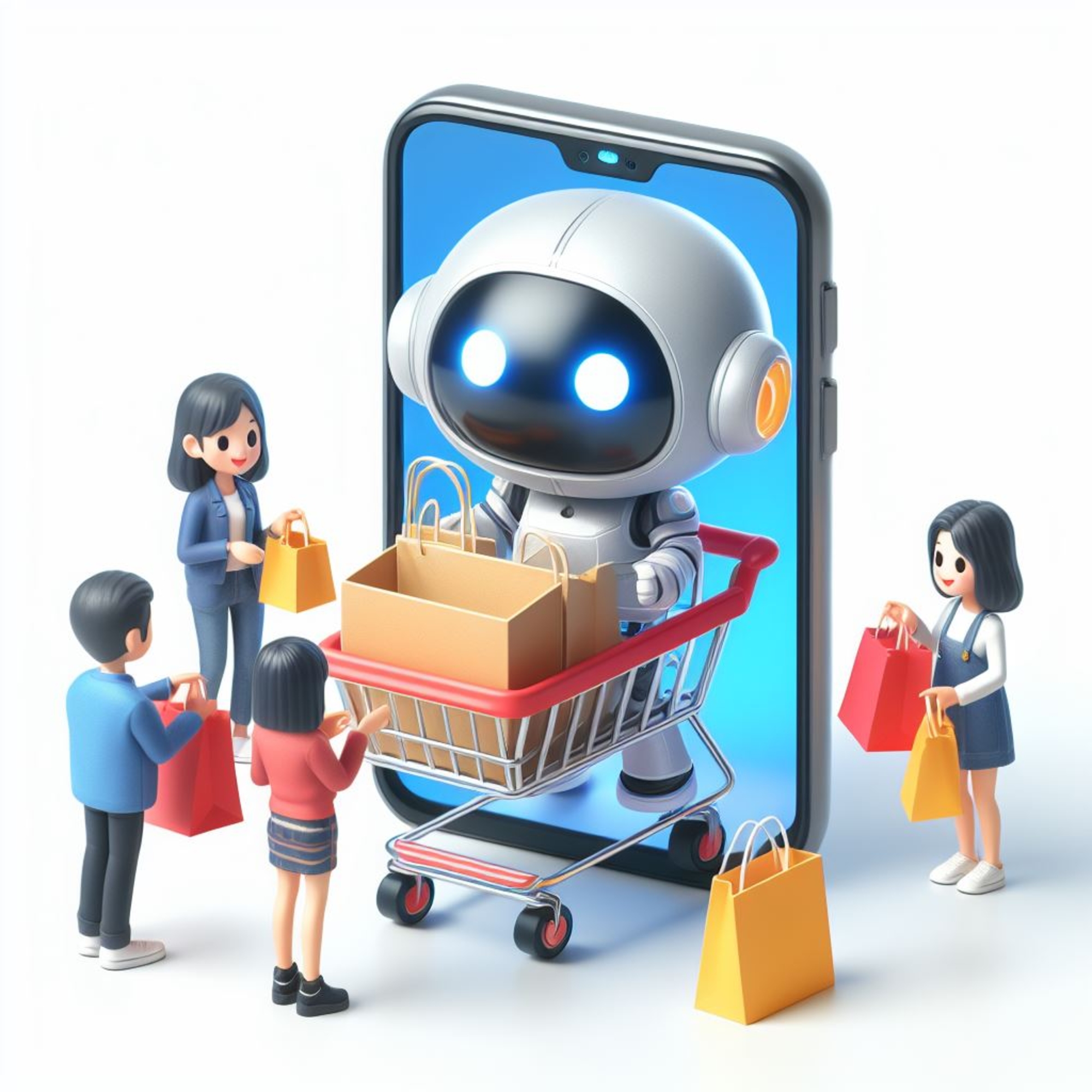Harnessing the Power of AI: 10 Must-See Tools to Skyrocket Your E-Commerce Sales
In the fast-paced world of e-commerce, staying ahead of the competition is crucial for success. As technology advances, artificial intelligence (AI) has emerged as a powerful tool that can revolutionize the way you run your online store. Whether you’re a seasoned e-commerce seller or just starting out, AI can help you level the playing field and compete with industry giants. With amazing features like improved product ranking, enhanced product visuals, and personalized customer experiences, AI is transforming the e-commerce landscape.
In this comprehensive guide, we’ll explore 10 incredible AI tools that can boost your online sales and take your e-commerce business to new heights. From creating stunning product images to automating personalized customer interactions, these tools harness the power of AI to deliver unparalleled results. Get ready to discover how AI can be your secret weapon in the world of e-commerce.
We strongly recommend that you check out our guide on how to take advantage of AI in today’s passive income economy.
Table of Contents
1. MidJourney: Creating Captivating Product Images with AI
MidJourney is a game-changing tool when it comes to creating AI-generated images for your e-commerce products. With MidJourney, you can bring your wildest imaginations to life, whether it’s Moana in real life, Ken from Barbie, or even Snoop Dogg as The Little Mermaid. The possibilities are endless!
To get started, simply type “imagine” followed by your desired prompt. For example, you could write, “IPA beer bottle on a wooden table with a blurred tavern background.” MidJourney will generate a set of stunning images based on your input. You can then use other tools to remove any existing branding on the bottle and replace it with your own, or even insert your own product bottle into the generated environment.
By leveraging MidJourney, you can elevate your product images from boring to captivating, grabbing the attention of potential customers and setting your e-commerce store apart from the competition.
2. Sh.Rider: Your Personalized AI Writing Assistant
Sh.Rider is a personalized AI assistant that adapts to your unique tone, language, and style. With Sh.Rider, you can create compelling website content, product descriptions, blog posts, emails, announcements, and social media posts that align perfectly with your brand’s voice.
One particularly useful feature of Sh.Rider for e-commerce businesses is its ability to check whether your product descriptions sound human or AI-generated. By pasting your product description into Sh.Rider and selecting the appropriate character (e.g., DIY expert, travel advisor), you can get an assessment of whether the text appears to be written by a human or AI. If the text seems AI-generated, Sh.Rider can help you paraphrase and refine it to ensure it reads naturally and ranks well in search engines.
Incorporating Sh.Rider into your e-commerce workflow can save you time and effort while ensuring your product descriptions are engaging, SEO-friendly, and reflective of your brand’s unique personality.
3. Mockar AI: Transforming Product Backgrounds with Ease
Mockar AI is a powerful tool that allows you to effortlessly change the backgrounds of your product images. Whether you start with a custom AI-generated image or a regular product photo, Mockar AI can help you create visually stunning product visuals that capture attention.
To use Mockar AI, simply upload your product image, and the tool will intelligently separate the product from the background. From there, you can choose from a variety of eye-catching backgrounds to place your product in, instantly elevating its visual appeal.
By utilizing Mockar AI in your e-commerce store, you can transform ordinary product images into captivating visuals that entice potential customers to explore your offerings further. Say goodbye to boring product shots and hello to images that showcase your products in the best possible light.
4. Clip Drop: A Suite of AI-Powered Image Tools
Clip Drop is a comprehensive suite of AI-powered tools that empowers you to create stunning visuals for your e-commerce store right from your browser. Created by the team behind Stable Diffusion, Clip Drop offers a wide range of features to enhance your product images.
With Stable Diffusion, you can generate high-resolution, realistic images based on text prompts. Reimagine allows you to create multiple variations of an image, while Stable Doodle transforms your simple sketches into real images within seconds. The Clean Up tool removes unwanted objects, people, text, and defects from your pictures, while the Remove Background feature extracts the main subject with incredible accuracy.
Clip Drop also offers tools to relight your images, upscale them for better quality, replace backgrounds, remove text, and even replace gray skies with vibrant blue ones. By incorporating Clip Drop into your e-commerce workflow, you can create visually stunning product images that captivate your audience and drive sales.
5. Runway: Advancing Creativity with AI
Runway is an AI-powered platform that aims to advance creativity across various domains, including e-commerce. With Runway’s magic tools, you can generate engaging videos and images to showcase your products in a whole new light.
One exciting use case for e-commerce businesses is the ability to create captivating product videos, even if you only have static images to work with. Runway’s AI algorithms can bring your products to life, generating dynamic visuals that tell a compelling story and engage potential customers.
Runway also allows you to infinitely expand images, reimagine them in different styles, train custom models, erase objects from videos, apply slow-motion effects, animate static images, and remove backgrounds from videos. By leveraging Runway’s AI capabilities, you can create visually stunning content that sets your e-commerce store apart and captures the attention of your target audience.
6. BeHuman: Personalized Video Creation for E-Commerce
BeHuman is an innovative AI tool that enables you to create personalized videos for your e-commerce customers automatically. With BeHuman, you can automate the creation of videos that greet each customer by name, making them feel valued and appreciated.
To experience the magic of BeHuman for yourself, simply visit their homepage, enter your first name and email address, and click “Generate.” Within minutes, you’ll receive a personalized video that showcases the incredible potential of AI-powered video creation.
BeHuman offers features like face cloning, voice cloning, background customization, LinkedIn automation, email and SMS integration, and more. By incorporating personalized videos into your e-commerce strategy, you can significantly increase open rates, click-through rates, and conversions. Imagine sending a personalized video to recover an abandoned cart or to welcome new customers—the possibilities are endless!
7. TDO: Exceptional Customer Service with AI-Powered Chatbots
TDO is an AI-powered chatbot platform that helps e-commerce businesses deliver exceptional customer service and drive sales through personalized interactions. With TDO, you can manage all your communication channels within a single solution, providing real-time support and guiding customers through your sales funnels.
TDO’s conversational chatbots go beyond generic responses, treating every website visitor as a VIP. By leveraging AI, TDO can recommend products at optimal moments, create customized shopping experiences, and solve customer problems efficiently.
One of the standout features of TDO is its seamless integration with popular e-commerce platforms like Shopify, WordPress, Wix, and more. By incorporating TDO into your e-commerce store, you can provide personalized, 24/7 customer support, drive leads, and boost sales through AI-powered conversations.
8. M.AI: Your E-Commerce Knowledge Partner
M.AI is more than just a note-taking app; it’s an AI-powered knowledge partner that can help you make informed decisions for your e-commerce business. By feeding M.AI with information about your online store, products, and customer interactions, you create a centralized knowledge base that can provide valuable insights and recommendations.
For example, you can ask M.AI questions like, “Which products should we sell for next Valentine’s Day?” or “What are some tagline ideas for our YouTube ads?” M.AI will analyze the data you’ve provided and generate tailored suggestions based on your unique business context.
M.AI also serves as a thought partner, helping you craft compelling ad copy, generate marketing ideas, and make data-driven decisions. By leveraging the power of AI, M.AI can help you stay ahead of the competition and make informed choices that drive your e-commerce business forward.
9. Holler AI: Simplifying Customer Feedback with One-Question Surveys
Holler AI revolutionizes the way e-commerce businesses collect customer feedback by introducing one-question surveys. By reducing friction and keeping surveys short and sweet, Holler AI maximizes response rates and provides AI-powered insights to help you improve your products and services.
With Holler AI, you can ask customers a single question about their experience with your product or store. The AI algorithms then analyze the responses and generate actionable insights, helping you prioritize key areas for improvement.
Holler AI also offers features like daily temperature checks, allowing you to monitor customer sentiment in real-time and adapt quickly to any issues or concerns. By leveraging the power of AI, Holler AI simplifies the process of gathering and analyzing customer feedback, empowering you to make data-driven decisions that enhance your e-commerce business.
10. Ad Creative AI: Boosting E-Commerce Conversions with Intelligent Ad Creation
Ad Creative AI is a powerful tool that helps e-commerce businesses create high-performing ads that drive conversions and revenue. By leveraging AI and machine learning, Ad Creative AI analyzes vast amounts of ad creative data to generate optimized ad variations that resonate with your target audience.
The process begins with the creative collection phase, where AI gathers ad content from various social and display platforms. Next, the creative analysis phase involves analyzing each ad and creating over 80 data points per image. The AI then trains its own unique machine learning model to generate high-ROI ad creatives and rank them based on their anticipated conversion rates.
By utilizing Ad Creative AI, e-commerce businesses can significantly boost their return on investment, reduce design workload by up to 90%, and scale their ad campaigns rapidly. Whether you have a single product or a thousand, Ad Creative AI can help you create winning ad creatives that drive sales and grow your e-commerce business.
Conclusion
In the competitive world of e-commerce, embracing artificial intelligence can be a game-changer for your online store. The 10 AI tools discussed in this article offer a wide range of capabilities, from creating captivating product images and personalized videos to generating engaging ad creatives and providing exceptional customer service.
By harnessing the power of AI, you can streamline your e-commerce operations, enhance the visual appeal of your products, and deliver personalized experiences that resonate with your target audience. Whether you’re looking to boost sales, improve customer satisfaction, or stay ahead of the competition, these AI tools can help you achieve your goals.
As you embark on your AI-powered e-commerce journey, remember to experiment, iterate, and continuously optimize your strategies. With the right tools and a customer-centric mindset, you can unlock the full potential of AI and take your online store to new heights.
Embrace the AI Revolution in E-Commerce
The future of e-commerce is intertwined with artificial intelligence, and the time to embrace this technology is now. By incorporating AI tools into your e-commerce workflow, you can gain a competitive edge, drive innovation, and deliver unparalleled value to your customers.
Start exploring the AI tools mentioned in this article and discover how they can transform your e-commerce business. Whether you’re a small startup or an established brand, AI has the power to level the playing field and help you achieve your goals.
Remember, the key to success in the AI-driven e-commerce landscape is to stay curious, adaptable, and customer-focused. By continually learning and leveraging the latest AI technologies, you can position your online store for long-term growth and success.
So, what are you waiting for? Embrace the AI revolution in e-commerce and unlock a world of possibilities for your online store. The future is here, and it’s powered by artificial intelligence.
Frequently Asked Questions (FAQs)
What is e-commerce and its features?
E-commerce, short for electronic commerce, refers to the buying and selling of goods or services over the internet. Some key features of e-commerce include:
- Online transactions: Customers can purchase products or services through websites or mobile apps.
- 24/7 availability: E-commerce stores are accessible round the clock, allowing customers to shop at their convenience.
- Global reach: E-commerce enables businesses to sell their products or services to customers worldwide.
- Personalization: E-commerce platforms can offer personalized recommendations and experiences based on customer preferences and browsing history.
- Multiple payment options: E-commerce websites usually support various payment methods, such as credit cards, debit cards, and digital wallets.
What are the four types of e-commerce?
The four main types of e-commerce are:
- Business-to-Consumer (B2C): This type of e-commerce involves businesses selling products or services directly to individual consumers.
- Business-to-Business (B2B): In B2B e-commerce, businesses sell products or services to other businesses, often in bulk quantities or at wholesale prices.
- Consumer-to-Consumer (C2C): C2C e-commerce platforms, such as online marketplaces, enable individual consumers to sell products or services to other consumers.
- Consumer-to-Business (C2B): In this less common type of e-commerce, individual consumers offer their products or services to businesses, often through platforms like stock photography websites or freelancing marketplaces.
What are the benefits of e-commerce?
E-commerce offers numerous benefits for both businesses and consumers, including:
- Convenience: Customers can shop from anywhere, at any time, using their preferred devices.
- Wider product selection: E-commerce stores can offer a more extensive range of products compared to physical stores, as they are not limited by physical space constraints.
- Competitive pricing: Online retailers often offer lower prices due to reduced overhead costs and increased competition.
- Easy comparison: Customers can quickly compare prices and features across multiple e-commerce websites to find the best deals.
- Time-saving: E-commerce eliminates the need for customers to travel to physical stores, saving time and effort.
- Targeted marketing: E-commerce platforms can use customer data to create targeted marketing campaigns and personalized recommendations.
What is an e-commerce platform?
An e-commerce platform is a software solution that enables businesses to create, manage, and operate online stores. These platforms provide the necessary tools and features to set up and run an e-commerce website, including:
- Website builder: E-commerce platforms often offer user-friendly website builders that allow businesses to create and customize their online store’s design and layout.
- Product management: E-commerce platforms provide tools to manage product listings, inventory, pricing, and descriptions.
- Shopping cart and checkout: These platforms integrate shopping cart functionality and secure checkout processes to facilitate online transactions.
- Payment gateway integration: E-commerce platforms support integration with various payment gateways, enabling businesses to accept online payments securely.
- Order management: E-commerce platforms help businesses manage and track orders, process refunds, and generate invoices.
- Shipping and tax calculations: Many e-commerce platforms offer built-in tools to calculate shipping costs and applicable taxes based on customer location and other factors.
Popular e-commerce platforms include Shopify, WooCommerce, Magento, and BigCommerce, among others.

We strongly recommend that you check out our guide on how to take advantage of AI in today’s passive income economy.




